Posted 9:24 a.m. Friday, March 31, 2017

UWL volunteers help local land preservation organization in unexpected ways.
UWL volunteers help local land preservation organization in unexpected ways
UWL senior Cal U’Ren is telling a story of the land. And he’s digging below the surface level. “It’s something you don’t think of when you’re just driving around the La Crosse area and you see a new development going up,” says U’Ren. “You don’t realize that that property probably used to be someone’s home, someone’s farm … it probably has a story.” This semester U’Ren is an intern with the Mississippi Valley Conservancy, capturing the stories of landowners across the Coulee Region who’ve made the step to protect their land from future development. The stories will be used in the organization’s newsletters and website. [caption id="attachment_48368" align="aligncenter" width="685"]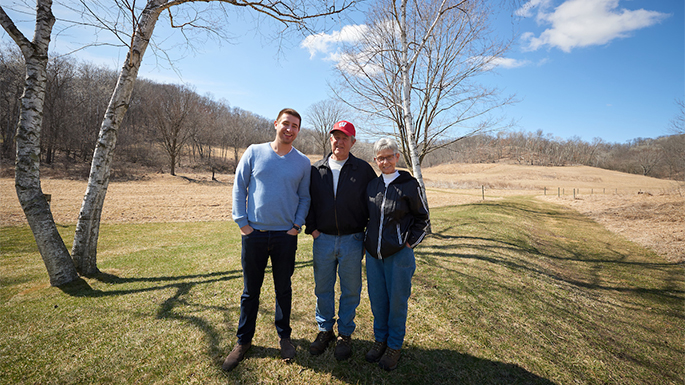 UWL student Cal U’Ren interviewed John and Louise Leary who told the story of a long sloping hill on their land where they installed pillars and a rope to create a ski hill for winter leisure. The couple has a land contract with MVC, which protects their land from being developed.[/caption]
UWL students, faculty and university retirees volunteer with MVC regularly. They help generate land maps, control invasive species and teach the public about ecology. But, students and faculty are also helping the organization in ways that have little to do with facts, figures or scientific data. Like U’Ren’s project — they focus on building the public’s emotional connection to the land.
Stories have the power to connect emotionally in ways that facts and figures can’t, and connecting people in meaningful ways to natural areas is key for preservation, says Carol Abrahamzon, Mississippi Valley Conservancy executive director.
UWL Associate Professor Kelly Sultzbach’s fall semester environmental literature course helped select literary pieces for the MVC to include on their website. They chose writings that relate to contemporary environmental themes and issues in the Midwest. Some of those pieces will appear on the website this spring with student annotations.
In early March, some of the same students volunteered to guide the public on a literature hike through the Upper Mississippi River National Wildlife and Fish Refuge in Brice Prairie north of La Crosse on Aldo Leopold Day. UWL students Emilie Clavette, Emily Hutwagner, Megan McCarthy, Emily Moua, and Mikayla Peters led the hike through the prairie, stopping at various spots to read.
[caption id="attachment_48370" align="aligncenter" width="685"]
UWL student Cal U’Ren interviewed John and Louise Leary who told the story of a long sloping hill on their land where they installed pillars and a rope to create a ski hill for winter leisure. The couple has a land contract with MVC, which protects their land from being developed.[/caption]
UWL students, faculty and university retirees volunteer with MVC regularly. They help generate land maps, control invasive species and teach the public about ecology. But, students and faculty are also helping the organization in ways that have little to do with facts, figures or scientific data. Like U’Ren’s project — they focus on building the public’s emotional connection to the land.
Stories have the power to connect emotionally in ways that facts and figures can’t, and connecting people in meaningful ways to natural areas is key for preservation, says Carol Abrahamzon, Mississippi Valley Conservancy executive director.
UWL Associate Professor Kelly Sultzbach’s fall semester environmental literature course helped select literary pieces for the MVC to include on their website. They chose writings that relate to contemporary environmental themes and issues in the Midwest. Some of those pieces will appear on the website this spring with student annotations.
In early March, some of the same students volunteered to guide the public on a literature hike through the Upper Mississippi River National Wildlife and Fish Refuge in Brice Prairie north of La Crosse on Aldo Leopold Day. UWL students Emilie Clavette, Emily Hutwagner, Megan McCarthy, Emily Moua, and Mikayla Peters led the hike through the prairie, stopping at various spots to read.
[caption id="attachment_48370" align="aligncenter" width="685"]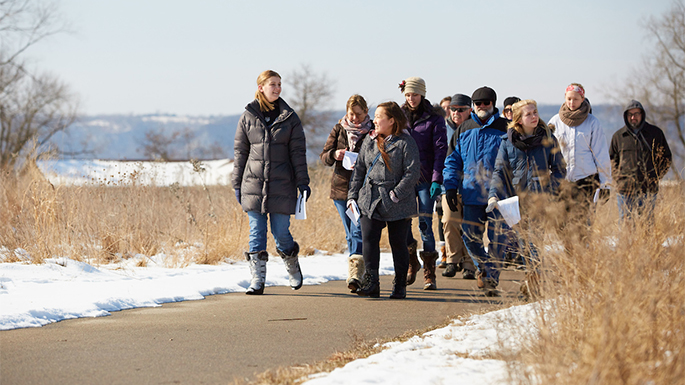 UWL students volunteered to guide the public on a literature hike on Aldo Leopold Day. Students who designed and led the hike included: Emily Hutwagner, Megan McCarthy, Mikayla Peters, Emilie Clavette and Emily Moua.[/caption]
They read excerpts from Leopold’s "A Sand County Almanac,” as well as other selections from poets and authors that students found shared some of Leopold’s same concerns.
Sultzbach says an interdisciplinary conversation that goes beyond science is needed in ecosystem preservation, and MVC gets that.
Leopold did too. The final essay in “A Sand County Almanac” is Leopold’s “Land Ethic,” the call for a moral responsibility or caring for the natural world.
[caption id="attachment_48372" align="aligncenter" width="685"]
UWL students volunteered to guide the public on a literature hike on Aldo Leopold Day. Students who designed and led the hike included: Emily Hutwagner, Megan McCarthy, Mikayla Peters, Emilie Clavette and Emily Moua.[/caption]
They read excerpts from Leopold’s "A Sand County Almanac,” as well as other selections from poets and authors that students found shared some of Leopold’s same concerns.
Sultzbach says an interdisciplinary conversation that goes beyond science is needed in ecosystem preservation, and MVC gets that.
Leopold did too. The final essay in “A Sand County Almanac” is Leopold’s “Land Ethic,” the call for a moral responsibility or caring for the natural world.
[caption id="attachment_48372" align="aligncenter" width="685"]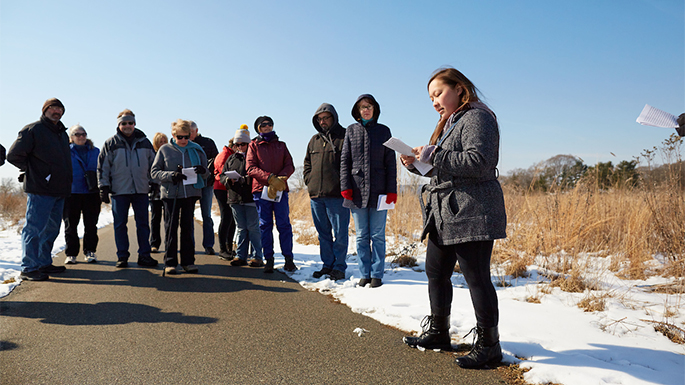 UWL student Emily Moua reading during the literature hike. Students read excerpts from Leopold’s "A Sand County Almanac,” as well as other selections from poets and authors that students found shared some of Leopold’s same concerns.[/caption]
“I think it’s important for people to realize that part of Leopold’s legacy is not just the ecological work he did,” says Sultzbach. “His insistence on a land ethic reminds us that when we think of environmental issues, we have to combine human issues and tap into human values that allow us to care for something beyond the economic or dollar value.”
The literature-related activities have helped Sultzbach’s students understand that literature is not just a thing of the past. It sparks imagination, which can transport the reader into new and sometimes non-human experiences that allow them to see the environment in a new way. For instance, a story about a small mouse running through the woods helps the reader see habitat from a new point of view. Readers can understand new values and question things they wouldn’t otherwise. That can drive new scientific questions, and ultimately change the course of history, says Sultzbach.
It can change students’ history too.
U’Ren says he initially took Sultzbach’s environmental literature course because he knew nothing about it. They read authors like Ralph Waldo Emerson and Henry David Thoreau, and it got U’Ren thinking.
“They lived the life of someone who didn’t need the material possessions. They didn’t even necessarily need human interaction,” he says. “They appreciated things around them like nature or other things that don’t have monetary value. Those things can still be harnessed to bring you happiness.”
U’Ren says he learned about MVC when Sultzbach brought Abrahamzon, of MVC, in to talk to the class, and they began working on the organization’s website. U’Ren decided to call MVC to see if they had any internship opportunities.
“I’ve had peers who also had a class and then went and got involved in the student senate or an organization,” he says. “It may not change the world, but at least you are taking a step toward doing something about it rather than being a bystander.”
Sultzbach says the class helps students see literature doing something more complex and involved in the contemporary world — influencing politics and ideas.
[caption id="attachment_48373" align="aligncenter" width="685"]
UWL student Emily Moua reading during the literature hike. Students read excerpts from Leopold’s "A Sand County Almanac,” as well as other selections from poets and authors that students found shared some of Leopold’s same concerns.[/caption]
“I think it’s important for people to realize that part of Leopold’s legacy is not just the ecological work he did,” says Sultzbach. “His insistence on a land ethic reminds us that when we think of environmental issues, we have to combine human issues and tap into human values that allow us to care for something beyond the economic or dollar value.”
The literature-related activities have helped Sultzbach’s students understand that literature is not just a thing of the past. It sparks imagination, which can transport the reader into new and sometimes non-human experiences that allow them to see the environment in a new way. For instance, a story about a small mouse running through the woods helps the reader see habitat from a new point of view. Readers can understand new values and question things they wouldn’t otherwise. That can drive new scientific questions, and ultimately change the course of history, says Sultzbach.
It can change students’ history too.
U’Ren says he initially took Sultzbach’s environmental literature course because he knew nothing about it. They read authors like Ralph Waldo Emerson and Henry David Thoreau, and it got U’Ren thinking.
“They lived the life of someone who didn’t need the material possessions. They didn’t even necessarily need human interaction,” he says. “They appreciated things around them like nature or other things that don’t have monetary value. Those things can still be harnessed to bring you happiness.”
U’Ren says he learned about MVC when Sultzbach brought Abrahamzon, of MVC, in to talk to the class, and they began working on the organization’s website. U’Ren decided to call MVC to see if they had any internship opportunities.
“I’ve had peers who also had a class and then went and got involved in the student senate or an organization,” he says. “It may not change the world, but at least you are taking a step toward doing something about it rather than being a bystander.”
Sultzbach says the class helps students see literature doing something more complex and involved in the contemporary world — influencing politics and ideas.
[caption id="attachment_48373" align="aligncenter" width="685"]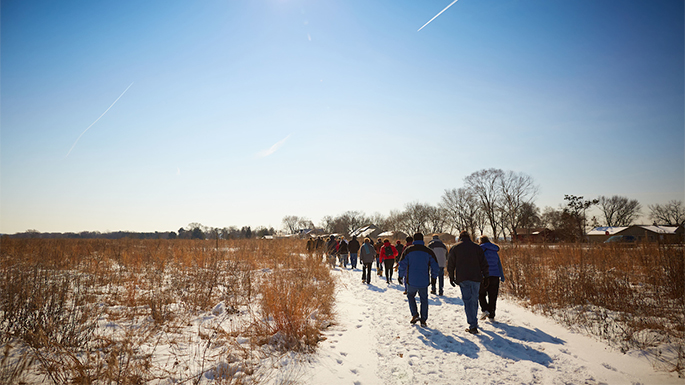 A literature hike was one way students and faculty are also helping this local organization in ways that have little to do with facts, figures or scientific data.[/caption]
U’Ren says he used to look at property as something people owned.
“Now I look at it more as an asset to your life,” he says. “You can purchase it and own it, but it is going to give back to you. It can bring you joy, space to plant things or do leisure activities — things you wouldn’t be able to do without it.”
Abrahamzon says working with UWL is particularly beneficial to MVC because it gets young people engaged in land protection.
“If you don’t engage, expose, and get younger people excited about the work you do now, when they have the resources of finances and time, they’ll probably take them somewhere else,” she notes. “We need to expose people of all ages to the work we do, so we can continue to do it.”
Students combine literature and environment
[caption id="attachment_48375" align="aligncenter" width="685"]
A literature hike was one way students and faculty are also helping this local organization in ways that have little to do with facts, figures or scientific data.[/caption]
U’Ren says he used to look at property as something people owned.
“Now I look at it more as an asset to your life,” he says. “You can purchase it and own it, but it is going to give back to you. It can bring you joy, space to plant things or do leisure activities — things you wouldn’t be able to do without it.”
Abrahamzon says working with UWL is particularly beneficial to MVC because it gets young people engaged in land protection.
“If you don’t engage, expose, and get younger people excited about the work you do now, when they have the resources of finances and time, they’ll probably take them somewhere else,” she notes. “We need to expose people of all ages to the work we do, so we can continue to do it.”
Students combine literature and environment
[caption id="attachment_48375" align="aligncenter" width="685"]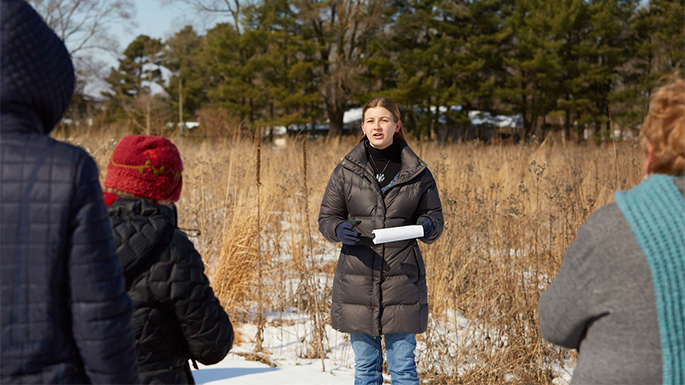 UWL student Mikayla Peters reading during the literature hike through the Upper Mississippi River National Wildlife and Fish Refuge in Brice Prairie north of La Crosse on Aldo Leopold Day.[/caption]
Students chose literary pieces to read on the environmental hike on Aldo Leopold Day, and provided annotation explaining how the pieces relate to environmental issues. The following is an excerpt from one of the literary pieces read during the hike.
Excerpt of a few lines from “The Sandhills” by Linda Hogan, (pub. 2011)
The language of cranes
we once were told
is the wind. The wind
is their method,
their current, the translated story
of life they write across the sky.
"Sandhill" student interpretation points from annotation written by Olivia Dubiel and presented at Leopold hike by UWL Student Megan McCarthy:
UWL student Mikayla Peters reading during the literature hike through the Upper Mississippi River National Wildlife and Fish Refuge in Brice Prairie north of La Crosse on Aldo Leopold Day.[/caption]
Students chose literary pieces to read on the environmental hike on Aldo Leopold Day, and provided annotation explaining how the pieces relate to environmental issues. The following is an excerpt from one of the literary pieces read during the hike.
Excerpt of a few lines from “The Sandhills” by Linda Hogan, (pub. 2011)
The language of cranes
we once were told
is the wind. The wind
is their method,
their current, the translated story
of life they write across the sky.
"Sandhill" student interpretation points from annotation written by Olivia Dubiel and presented at Leopold hike by UWL Student Megan McCarthy:
- The repeated alliteration of the use of “w” gives you a sense of wind in your own body.
- The poem also gives the reader a personified view of the crane; they have ancestors and tradition, too. Like a gathering of relatives, the poem gives a warm sense of reunion and community.
- The beauty of the crane and the beauty of their intelligence, appreciation for their ability to find the same spot year after year, they have their own language and story to tell, just like people.
